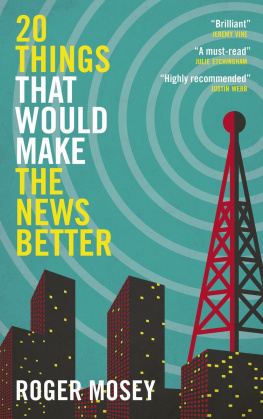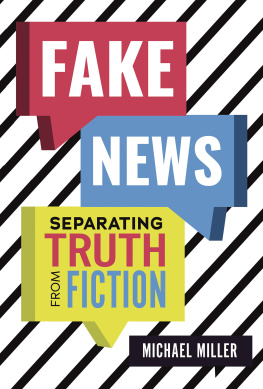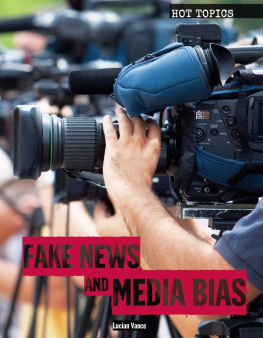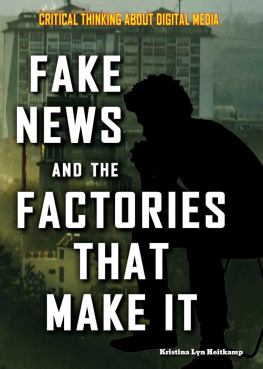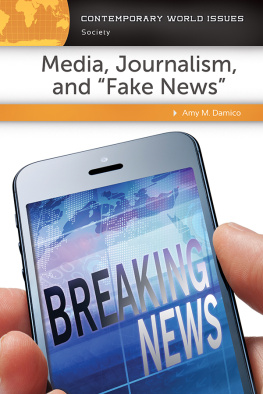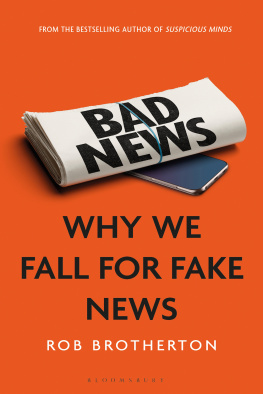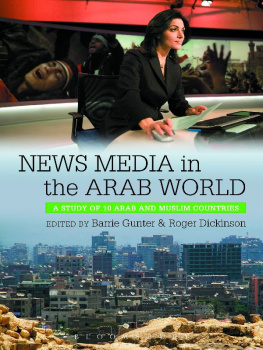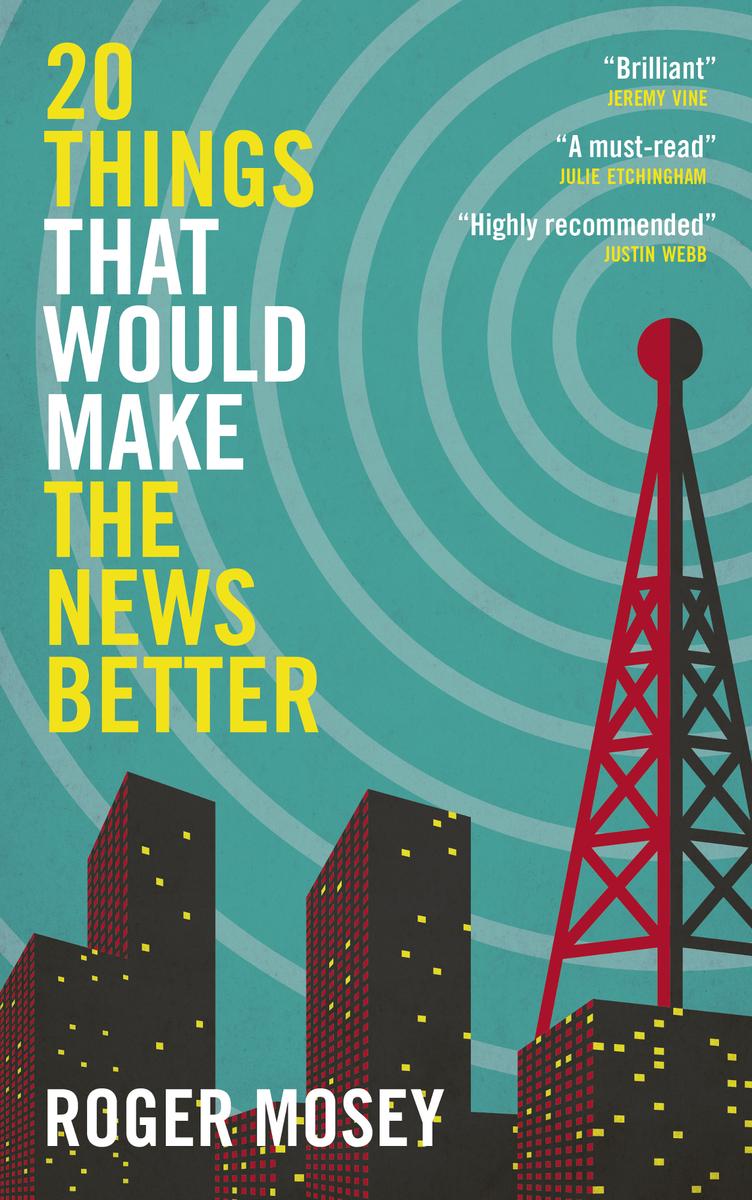T his is a book about news and why it matters, in which youll find plenty of hobby horses. A whole herd of them, if Im honest, and I hope you will become fond of at least some.
It began in 2018 with an invitation from Selwyn Colleges development director Mike Nicholson to talk to alumni and friends about my years at BBC News, and we came up with the title 10 Things to Make the News Better. The idea was to focus on the positive and to weld my experience in newsrooms during my thirty-three years at the BBC with the observations and prejudices of an enthusiastic consumer of broadcast news now living in Cambridge. It seemed to go down well, particularly in that my hobby horses were joined by lots of new ones. Members of the audience added a list of things they like and things they dont, though I had to tell them it really was no longer my responsibility that x journalists dont understand the difference between less than and fewer than.
I then developed some of the themes further in the United States, through a lecture at the University of California in Los Angeles. The event was jointly arranged with Cambridge in America and BAFTA Los Angeles, and it had some American hobby horses to join the British ones. At the time, the coverage of Donald Trump was the thorniest of issues and it helped shape thoughts about the responsibilities of media organisations and their connection with the electorate. The audience in the UCLA lecture theatre had a spirited debate in the question-and-answer session about what to add to and subtract from the list of proposed improvements to news coverage.
So, now, following a kind invitation from my friends at Biteback Publishing, Im taking this a stage further: updating the thoughts doubling the size of the herd and inviting a new audience to join the discussion. And there are some ground rules I need to explain. First, this is overwhelmingly about broadcast news partly because its what I know about, but also because it is still central to national and international debates. Second, it will talk about the BBC more than any other organisation again, because its something Im familiar with and because it does actually matter more than most. It should be, and often is, the gold standard. I particularly salute its staff, who work tirelessly to do the best they can despite the geographical relocations and internal xi reorganisations which drive them up the wall. Third, it will dwell quite a lot on politics, because the relationship between Westminster and the media is broken and needs the most attention. By contrast, foreign reporting delivered by some outstanding correspondents is going through a conspicuously strong phase, as weve seen most recently in Ukraine and in revelatory broadcasts from Afghanistan, Yemen, Ethiopia and even America, where ITVs coverage of the 6 January 2021 Capitol insurrection deservedly won awards galore. And fourth, I absolutely do not believe in the myth of a golden age. There were many bad things in the past, just as there are some areas that should be improved today. My contention is that it should be possible to merge the best of then with the best of now.
In the past, some BBC managers have become grumpy about dinosaurs like me critiquing their organisation. Well, I love it too, but it belongs to all of us and I believe its right for there to be accountability for the BBCs practices and policies. If its to be one of the most open organisations in Britain, which it has struggled to achieve in the past, then it needs challenge and analysis. There is plenty of space between those who argue that the BBC can do no wrong and the folk who want to destroy it. In the term critical friend, both words matter, and I am unequivocal that I want the BBC to survive and thrive. Crucially, it can do that most effectively if it is at the top of its game. Recognising weaknesses is a part of that drive for excellence because even xii with its faults its a dozen times better than the unregulated and user-generated alternatives.
Yet the BBC is far from being the sole guarantor of standards in journalism. Every day I see and hear and read excellent journalism from LBC radio to The Times, and from Sky News to The Spectator and New Statesman. Podcasts bring in new voices; social media allows the audience to answer back. There are so many sources of information and so much to enjoy.
But the warning signs are there too. These are fractured, difficult times. Media can spread hatred. Trust in authorities and in established media organisations is precarious, not least because the newer platforms, notably Twitter, can whip up a mob against them. So, it would be foolish to imagine that we can continue exactly as we are, and thats why we need to have the argument: how is it that we can make the news better more relevant, more valuable, more ambitious and through that try to bring our society closer together? What follows are thoughts and provocations to feed into the debate, and ultimately it will be the consumers of news who deliver their verdict. They will either stay with the mainstream media and encourage its reinvigoration or ensure its splintering into thousands of disparate pieces. And the stakes are so high because once it has fractured, there will be no putting it back together again.
M y love affair with broadcast news began by night at my home in Bradford in the early 1970s. School work done, I would switch on a cheap transistor radio next to my bed and listen to The World Tonight then one of Radio 4s newest programmes and its main presenter Douglas Stuart. As now, this was a time of tumult. I learned about the Middle East oil crisis, the superpower tensions of the Cold War, the blood spilt on the streets of Northern Ireland; the world was brought directly to me through on-the-ground reporting and the painting of word pictures. The interviews with leading figures of the day were conducted courteously the tougher stuff was left to Robin Day on television and accompanied by analysis of what the latest developments meant for us all. If it was possible to feel calm amid the turbulence, I did: there was authority in the voices I heard, and this was not a programme where guests were booked to provide a punch-up. It was much more about enlightenment. Even if you disagreed with what was being said, there was no recourse other than to write a letter to the BBC and receive the blandest of replies a week later from its audience services team. Douglas Stuart had the blessing of never trending on Twitter.
A little later in the Radio 4 schedule was another favourite for a politics-obsessed schoolboy: the nightly broadcast of Today in Parliament. In those days the programme relayed no braying of MPs or shouting down of party leaders, because it was still some years before the microphones were allowed into the parliamentary chambers and even longer until the arrival of television cameras. So, the passionate debates of the 70s when Britain was considering whether to join the European Community were rendered in the beautifully modulated tones of Radio 4 continuity announcers. Even so, the heat of the argument was unmistakable, with the Heath government under attack from its own Eurosceptics and the Labour Party also split and fighting a tactical war in the House of Commons. Armed with what I had learned from the nightly digests, as a sixteen-year-old I canvassed in the two 1974 general elections on behalf of the Liberal Party and earnestly told voters in Bradford South why I believed the two-party system had failed.

